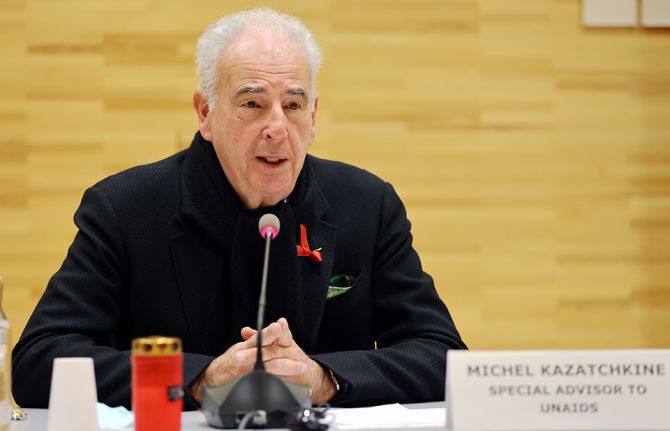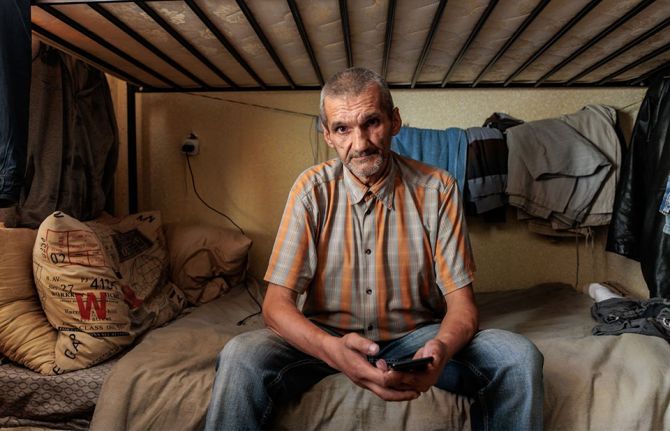

Opinion
We cannot let war in Ukraine derail HIV, TB and Covid-19 treatment in eastern Europe
09 March 2022
09 March 2022 09 March 2022By Michel Kazatchkine — This article appeared first on The Telegraph
It is no surprise that the World Health Organization (WHO) is calling for oxygen and critical medical supplies to safely reach those who need them in Ukraine and moving to establish safe transit for shipments through Poland. But nor is the call new. We`ve been here before.
Russian annexation of Crimea and the conflict in the Donetsk and Luhansk oblasts of Eastern Ukraine in 2014 threatened the supply of HIV and tuberculosis medicines. Fragile trans-internal border efforts and financing by the Global Fund to Fight Aids, Tuberculosis and Malaria allowed the continued supply of the medicines in the separatist territories despite the conflict during the last eight years.
One has to assume that should Russia occupy new Ukraine territories, the challenges to guarantee people living with tuberculosis and HIV access to those drugs will be just as great, high risk, if not already lost.
The separatist authorities in the Donbass and the Russian administration in Crimea also abruptly stopped opioid agonist therapy (OAT) for people who inject drugs, which resulted in much suffering and deaths from overdose and suicide.
NGOs working with affected communities in Donbass were basically closed down. Decades of fighting HIV and tuberculosis have taught us just how critical civil society, community leadership and human rights are to ending those diseases.
The Russian Federation refuses to countenance OAT as a harm reduction measure to reduce the risk of HIV transmission through shared needles.
Ukraine on the other hand, is a notable champion of harm reduction, including OAT and needle exchange programs. This matters greatly in eastern Europe and central Asia which continues to be home to the fastest growing HIV epidemic in the world.
Some 1.6 million people are living with HIV in the region (with Russia accounting for 70 per cent) and around 146,000 are newly infected each year. Drug use accounts for around 50 per cent of new infections but unprotected sex is set to become the main driver in the coming years.
Ukraine, however, has been one on of the most successful countries in the region in terms of guaranteeing access to antiretroviral drugs – 146,500 people in the past year.
These gains were at risk before the war with Covid-19 restrictions seeing a drop in people testing by a quarter in 2020. The coming weeks and months of war will cause this effort to collapse entirely.
Eastern Europe also remains the global epicentre of multi-drug resistant tuberculosis globally. Despite progress in the last ten years, TB prevalence, mortality levels and particularly, incidence of multi-drug resistant tuberculosis remain high in Ukraine which has the second highest number of cases in the region.
Drug resistant tuberculosis represents around 27.9 per cent of new tuberculosis patients and 43.6 per cent of previously treated patients and treatment success of multi-drug resistant tuberculosis is around 50 per cent.
If Covid-19 halved case detection in 2020, it is not hard to imagine it being totally wiped out by the ongoing war.
As health systems collapse and treatment and prevention services are interrupted, mortality from HIV, tuberculosis, multi-drug resistant tuberculosis and Covid-19 will readily increase in Ukraine. Hundreds of thousands of people are internally displaced and cities such as Lviv are running short of medicines and medical supplies.
Scarily, the fallout of the invasion will also go beyond Ukraine: over a million refugees have already fled for their lives. The impact of this will be felt across border towns and areas in central Europe whose response to tuberculosis, HIV and more recently Covid-19, has been fragile.
Border locations and neighboring countries will have to anticipate and address an avalanche of new health needs. We are at an impasse: international cooperation and solidarity towards the Eastern European region has not been a strong feature of the last two years of the global pandemic response.
The arrival of WHO health supplies and the formation of a safe corridor for refugees are fragments of good news in this unfolding tragedy, but we need so much more.
Health systems and facilities must be protected, be functional, safe and accessible to all who need essential medical services, and health workers must be protected.
Michel Kazatchkine is Course director at the Graduate Institute for International Affairs and Development in Geneva, Switzerland, and the former UN Secretary General and UNAIDS special Envoy on HIV/AIDS in Eastern Europe and central Asia. Previous to that he was the Executive Director of the Global Fund to fight AIDS, TB and malaria.
Region/country
Related
 Ukraine: Keeping people in care
Ukraine: Keeping people in care

23 February 2026
 Women, HIV, and war: a triple burden
Women, HIV, and war: a triple burden

12 September 2025
 Displacement and HIV: doubly vulnerable in Ukraine
Displacement and HIV: doubly vulnerable in Ukraine

11 August 2025
